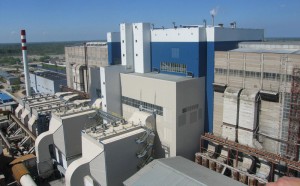
Ninety percent of Estonian electricity is generated from the burning of oil shale. Photo used courtesy of Eesti Energia.
TALLINN — Taking advantage of the open Baltic energy market soon coming into effect , Eesti Energia will supply around ten percent of Lithuania’s energy needs following the shut down of its Soviet-era nuclear plant in Ignalina at the end of this year.
The deal would mean a 50 percent increase in exports and a projected half billion krooni (around €31 million euros) for the Estonian energy company annually.
“Next year, we want to sell Lithuania a terawatt-hour of electricity,” Eesti Energia representative Jaanus Arukaevu said. “Lithuanian power stations are able to provide for the country, but it would raise electricity prices to the same level with Germany.”
Eesti Energia will sell the power to Lithuania via its subsidiary in the country, Enefit.
“Enefit is ready to supply as much electric energy as Lithuanian consumers will be interested to buy as long as transparent and equal market functioning conditions for all market participants will be established by local authorities,” Enefit head, Liudas Liutkevičius, told Baltic Reports.
The open energy market, which will remove tariffs and protectionist policies between the countries, is not yet in operation meaning that until the end of the year Lithuania’s restrictions on imports restrict sales to Lithuania.
The purchase will make up part of the 30 percent of energy that the Lithuanian Ministry of Energy have planned to buy from external sources after this year. Other sources will come from Russia, Belarus and Ukraine.
There are widespread fears that Lithuanian energy interests could fall solely into the hands of the Russian government, leaving it vulnerable to politically motivated moves. Liutkevičius said this reason makes Eesti Energia important to Lithuania.
“Eesti Energia can provide stability in terms of supply volume and price, which is very important for security of supply in Lithuania in general and of course to our clients,” he said.
Two-time former president of Lithuania Algirdas Brazauskas said the current government is acting naively and should get prepared for Russian dominance over the energy market.
“We do not have links to Sweden, Finland and Poland. There is only one source – Russia,” Brazauskas told Delfi.
Lithuania only has connections to the energy grids of the former Soviet countries, making it unable to import energy from other European countries. Two projects are underway to connect Lithuania to the Nordic power grid and the Western European grids via Poland, but neither will be complete until 2012 at the earliest.
Prime Minister Andrius Kubilius said on radio that Russia had mentioned plans to build a new nuclear reactor in the Kaliningrad exclave and that Lithuania, Poland and Germany had been invited to participate. Kubilius said, however, that Lithuania can provide its own electricity for now and does not want to fall deeper into reliance on Russian sources.
Liutkevičius said Enefit has already started negotiations with corporate clients in Lithuania. The company’s main areas of activity will be the sale of electric energy to end-consumers and new generation projects in Lithuania.
“The company’s objective is to enter the Lithuanian electricity market and become the leading competitor on the local electricity supply market. In 2010 the market will be opened and cross-border trade obstacles removed, then our first target will be to start electricity sales to large industrial consumers,” Liutkevičius said.
Most of Estonian energy is generated from oil shale deposits, of which Estonia has the world’s richest source. It also uses wind farms, hydroelectric plants and plans to build a new waste energy block plant.
Fraudulent bookkeeping
Meanwhile, at home Eesti Energia has been accused of fraudulent bookkeeping after it was revealed that up to 65,000 customers in the country don’t even have to pay their bills due to illegal invoicing.
The invoices sent are illegal because they violate the country’s Metrology Act, Electrical Act and perhaps even the Competition Act — electricity meters that are not verified once every 16 years are deemed as unreliable and therefore unusable for invoicing purposes.
The scandal became public after an internal communication revealed the problem as early as January. The company decided not to change old electricity meters since it would have cost 50 million krooni.
Eesti Energia’s own lawyer confirmed that using unverified electricity meters breaks the three laws and it could warrant fines. Breaking the country’s Metrology Act could result in a fine of 30,000 krooni per case, leaving the company liable to around 2 billion krooni in total.
“The point is that measuring with suitable devices is the basis of network and electricity business. If the goods isn’t measured then there’s no right to ask for money,” the lawyer wrote. “Consumers, who’s devices are not suitable, have the right of declining payment and claim proof to used amounts.”












